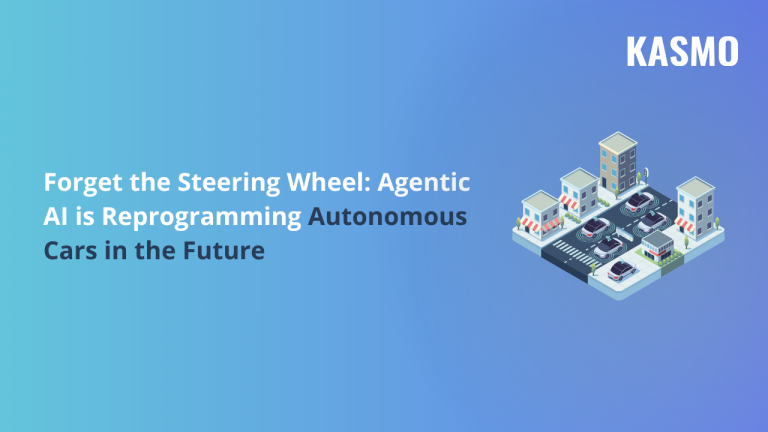How Autonomous Cars in the Future Can Bring a Massive Transformation to the Automotive Industry

Source: McKinsey
With automation and AI creating new waves of transformation in the automotive industry, autonomous cars in the future are most likely to increase your revenue as well as enhance customer engagement. IoT in cars is rapidly transforming the way automotive companies sell cars to their customers. Now, it is more than just selling vehicles to their customers – it is about how better they can sell experiences when compared to their competitors.
Personalization is a requirement for every business, irrespective of their industry. Automation in vehicles powered by artificial intelligence (AI), advanced driver-assistance systems (ADAS), and IoT-enabled technologies, is not just a futuristic vision anymore—they are quickly becoming a viable reality.
The growing implementation of automation in vehicles is driven by advancements in AI, sensor technologies, machine learning, and connectivity. These developments allow cars to operate with minimal human intervention, optimizing routes, monitoring vehicle health, and ensuring passenger safety.
Leveraging AI, automotive businesses provide seamless mobility to the elderly and disabled and transforms travelling into a productive or entertaining experience, creating a bright future of autonomous vehicles.
Due to rapid integration of IoT in cars, vehicles can now “communicate” with each other, the user, and even pedestrians. This leads to smart traffic management and predictive maintenance. Leveraging AI in automotive industry is reshaping the way we drive and redefining how we live, commute, and interact with vehicles.
Benefits of Deploying Automation in Vehicles
The benefits of deploying automation in vehicles are multifaceted, impacting auto buyers, Original Equipment Manufacturers (OEMs), and dealers:

Enhanced Safety
Many consumers still believe that deploying automation in vehicles leads to increased accidents. However, it is completely a myth, as autonomous cars in the future are predicted to not only reduce road accidents but also improve user experience. With automation, vehicles can detect obstacles, adhere to traffic laws, and make real-time adjustments to avoid collisions. ADAS features like lane-keeping assistance, adaptive cruise control, and automatic emergency braking are already reducing accidents. A European study projects that ADAS adoption could reduce road accidents by 15% by 2030.
Improved User Experience
For long-distance commuters, autonomous vehicles allow them to multitask while traveling. Instead of focusing on the road all the time, passengers can work, relax, or engage in entertainment, improving their experience. Additionally, autonomous vehicles can run longer hours without needing human assistance at all times, reducing user fatigue.
Greater Accessibility
Connected cars can provide mobility for people who cannot drive due to age, disability, or lack of access to public transportation. This inclusive mobility allows automotive companies to focus on different segments of the market, creating new revenue opportunities.
Environmental Benefits
Automation in vehicles significantly reduces fuel consumption and greenhouse gas emissions. Optimized routing and consistent driving behavior enhances traffic management, which lowers carbon emissions. A University of Michigan study suggests self-driving vehicles could cut lifetime energy use and emissions by up to 9% compared to traditional cars.
Cost Savings
Automation in vehicles can bring down costs for both auto buyers and businesses. Predictive maintenance enabled by IoT in cars reduces unexpected repair costs. Moreover, insurance premiums could decrease as now the responsibility shifts from individual drivers to AV systems, leading to new, usage-based insurance models.
Reduced Traffic Congestion
Connected and autonomous vehicles can communicate with one another to optimize traffic flow, reduce congestion, and minimize commute times. This revolutionizes how authorities manage traffic and road accidents.
What are the Challenges Businesses Face While Deploying AI and Automation in Vehicles?
There are significant challenges to deploying autonomous cars in the future. Despite its advantages, auto manufacturers, suppliers, and tech companies must navigate technical, ethical, and infrastructural hurdles:
 Safety and Public Trust
Safety and Public Trust
While IoT in cars and AI in automotive industry has made remarkable progress, it has also faced a lot of scrutiny due to some unfortunate accidents. People are still wary about AI and machine models making decisions and controlling their vehicles. They fear that automotive companies are making decisions only relying on AI and AI-powered tools, without using their human intelligence. Building trust through transparency, rigorous testing, and clear regulations is critical for automotive companies if they want to gain user trust.
Data Privacy and Security
With IoT in cars generating massive amounts of data, cybersecurity and data privacy become crucial. Automotive companies need to protect sensitive consumer data which includes location, habits, and personal information from being exploited and used for unethical purposes by cyber criminals.
Infrastructure Limitations
Autonomous cars require roadways with clear markings, digital mapping, and reliable network connectivity. Inconsistent infrastructure, especially in rural areas, can limit automotive companies from deploying AI and automation in vehicles. Weather conditions like snow or heavy rain can also impair sensor performance, making full autonomy difficult in some regions.
High Development Costs
Designing, testing, and producing autonomous vehicles is expensive. The high cost of components like IoT devices and other AI-powered systems make it difficult for automotive companies to price their vehicles reasonably. Moreover, due to inflation and supply chain disruptions, equipment is expensive, making it difficult for manufacturers to set a fixed price on all their inventory.
Legacy Systems and Data Silos
Many traditional automakers are burdened with fragmented data and legacy systems, making it difficult for them to harness the data for actionable insights. Automotive companies still leveraging legacy systems often struggle to unify vehicle, customer, and service data.
How Agentic AI can Help Businesses Leverage AI and Sell Autonomous Cars in the Future?
Empowering Sales Teams with Real-Time Insights and Forecasting
Agentic AI equips sales teams of automotive companies with intelligent and customizable dashboards that provide real-time insights into their personal sales quotas, team performance, and customer journey. By continuously analyzing sales data and customer interactions, AI Agents can identify forecast gaps and showcase the most promising deals to sales reps, which enables them to create data-driven strategies.
This data-driven approach not only boosts sales efficiency but also accelerates the process of closing deals for autonomous vehicles. Your sales team can only sell autonomous cars in the future if you leverage AI to consolidate data and gather insights from them to understand consumer behavior and develop personalization strategies accordingly.
Creating Personalized Vehicle Experiences
The future of autonomous vehicles is heavily reliant on delivering immersive, personalized experiences that enhance driver comfort, safety, and provides personalized entertainment. Agentic AI leverages connected vehicle data and advanced machine learning algorithms to tailor in-car services based on driver behavior, preferences, and real-time data.
From adjusting cabin settings to recommending routes or offering personalized media content, AI Agents enable automotive companies to rapidly deploy connected vehicle subscriptions and mobility solutions at scale to their consumers. These hyper-personalized experiences transform autonomous vehicles, driving higher customer satisfaction and loyalty.
Unlocking New Revenue Streams
Agentic AI enables automotive businesses to unlock new revenue opportunities by analyzing data sets from disparate sources, ranging from consumer demographics to individual purchase histories and vehicle maintenance patterns. AI Agents consolidate all this data into a single, unified platform and maintain data integrity.
This unified data allows automotive companies to design tailored subscription services, such as software feature upgrades, enhanced safety packages, or entertainment bundles, which can be tailored according to individual vehicle owners. With these data-driven insights into the sales and service processes, companies can drive higher upsell rates, create new revenue streams, and establish themselves as the forerunners of the automotive industry.
Integrating Vehicle and Driver Data into CRM Platforms
Agentic AI consolidates fragmented data, including vehicle data and driver profiles, into a single, unified customer relationship management (CRM) platform. Salesforce, the number #1 CRM platform, enables automotive companies to get a 360-degree view of every customer’s touchpoint. Salesforce automotive cloud facilitates seamless communication, personalized marketing campaigns, and efficient service management, which improves customer experience and retention.
Autonomous cars in the future will only get more popular, if automotive companies leverage Salesforce Automotive Cloud and Agentforce to deliver relevant offers and services tailored to each driver’s unique needs.
Leveraging Vehicle Telematics Data
Autonomous vehicles generate massive volumes of telematics data (refers to information gathered from a vehicle using GPS, onboard diagnostics, and wireless communication, typically transmitted to a central location for analysis and monitoring). Agentic AI transforms this data into actionable insights by identifying patterns that will help drivers understand vehicle health and automotive companies tailor services according to individual driver needs.
For example, a vehicle approaching a low battery could trigger automated notifications to the driver to recharge immediately and provide nearby charging locations. These personalized and timely notifications not only enhance driver safety and convenience but also create areas for automotive companies to send drivers with relevant products and service advertisements which will likely prompt them to purchase.
Enhancing Customer Service with Remote Vehicle Health Monitoring
Agentic AI empowers automotive service teams with sophisticated tools to remotely monitor vehicle health and control key features, such as locking or unlocking doors or sending mechanics when a vehicle suddenly breaks down. These capabilities enable automotive companies to improve driver safety.
As autonomous cars rely heavily on software and sensors, remote vehicle actions allow automotive companies to address issues quickly, reducing the need for drivers to be physically present during service visits. This enhanced customer service model builds trust and satisfaction by ensuring drivers feel supported throughout their ownership experience.
Building Trust with Auto Buyers
Building trust is extremely crucial when you are selling autonomous cars. Agentic AI helps build this trust by providing transparent, AI-generated summaries of vehicle health, driver engagement history, and warranty details to customer support teams.
These insights allow agents to clearly communicate the status of a vehicle, anticipate potential issues, and recommend proactive solutions. By making AI-driven decision-making understandable and actionable, businesses can reassure customers, reduce friction in service interactions, and enhance the overall ownership experience.
Facilitating Collaboration
The automotive industry thrives on collaboration with partners, including cloud service providers, IoT platform providers, and manufacturers. Agentic AI facilitates seamless integration and data sharing capabilities among these stakeholders, enabling automotive companies to create a smooth connected car experience.
Conclusion
Autonomous cars in the future will not replace human drivers, rather they will help drivers and enhance their efficiency by providing them with in-car entertainment, automated notifications on service updates, easy routing, and more.
These automated vehicles will reimagine the entire mobility experience. From improving road safety and reducing emissions to personalizing customer journeys and transforming vehicle ownership, automation in vehicles will reshape the automotive industry.
However, achieving this vision requires overcoming significant technical, ethical, and infrastructural challenges. Businesses must embrace AI agents, connected ecosystems, and CRM platforms like Salesforce that will help them make data-driven decisions, unlocking the full potential of automation in vehicles. By doing so, they will not only meet evolving customer expectations but also lead the next chapter of innovation in the automotive industry.





